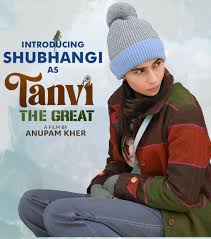In a world that often demands quiet conformity, Tanvi, a young woman from India, chose not to meet the expectations set for her. She had no interest in being “normal.” Instead, she turned her difference into a declaration.
Now known by the name many have given her — “Tanvi the Great” — she has emerged as a powerful voice in the growing conversation about identity, ability, and what society calls limitation.
“I’m not here to be inspirational because I live differently,” she says. “I’m here because I live truthfully.”
Strength, Rewritten
Born with a condition that marked her early on as “different” — a word she now wears without apology — Tanvi faced the quiet prejudice that defines so many lives on the margins: lowered expectations, unsolicited sympathy, and the overwhelming pressure to blend in.
But blending in was never her plan.
Instead of shrinking, she reclaimed the narrative, positioning her lived experience as a source of resilience and clarity. On stages, in classrooms, and across her growing digital following, Tanvi speaks not of overcoming disability, but of redefining what it means to thrive.
“She tells it like it is,” says Rohini Malhotra, a Delhi-based educator who invited Tanvi to speak at a youth inclusion workshop. “There’s no filter, and there’s no pity. Just presence.”
Rejecting a Myth Called ‘Normal’
The word “normal,” Tanvi often says, is a social myth — one that’s used less as a description and more as a weapon.
“People don’t realize how casually they use that word. Normal school. Normal body. Normal life,” she says. “But if you stop trying to be what someone else expects, you start becoming who you actually are.”
In her talks, she often begins not with disability, but with expectation — how it’s imposed, and who gets to define it. Her audience — from teenagers to teachers — listens, often with quiet astonishment, as she reframes not only her own story, but theirs too.
More Than Representation
Tanvi’s rise comes at a time when conversations around disability, neurodiversity, and inclusion are slowly shifting. But she warns against tokenism and polished, “feel-good” portrayals that reduce people to hashtags.
“I’m not your campaign. I’m not your emotional side story,” she says during a recent panel on inclusive education. “I’m a person who speaks, creates, leads. Don’t flatten me into your comfort zone.”
What sets her apart is not only her conviction, but her refusal to be defined by resilience alone. She brings joy, sarcasm, intellect, and a rare clarity to spaces that often expect performative gratitude from people with disabilities.
“She refuses to be boxed,” says Meera Shenoy, a disability rights advocate. “She doesn’t soften the truth to make you comfortable. That’s leadership.”
A Growing Cultural Shift
Tanvi’s influence goes beyond her social media following or speaking engagements. She is part of a quiet cultural shift — where young Indians are beginning to talk back to long-held assumptions about ability, beauty, success, and identity.
Her message is deceptively simple: Your difference is not your weakness. It might just be your greatest strength.
For now, she continues to speak, write, and organize — building a space where more people like her can be seen and heard on their own terms. Not for what they’ve “overcome,” but for what they create, question, and lead.
As for being called “Tanvi the Great”? She smiles.
“I didn’t choose the title. But I’ve earned it.”


